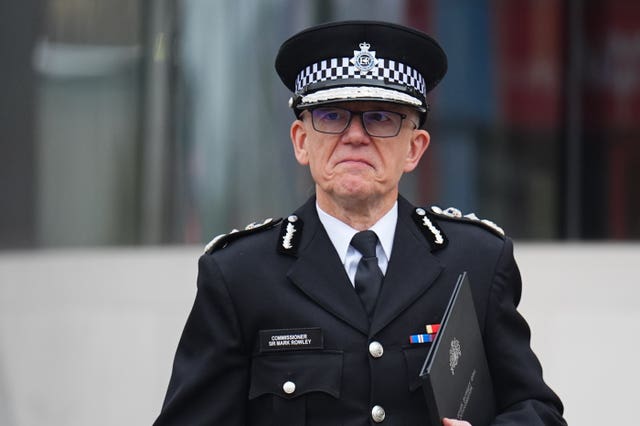Chief officers call for radical overhaul of structure of UK policing
The head of the National Police Chiefs’ Council Gavin Stephens said he would back a model with fewer, larger forces.

Police chiefs in England and Wales want a radical overhaul of the structure of UK policing with fewer, larger forces, amid financial shortages and difficulties dealing with fraud and updating technology.
The current structure of 43 geographical forces was established in the 1960s and there have long been concerns that the model is not fit for purpose.
As the National Police Chiefs’ Council (NPCC) published the police data strategy for 2025 to 2030 on Thursday, force bosses called for a redesign of the structure of policing in England and Wales.
NPCC chairman Gavin Stephens said: “We need police forces that are strong and capable to be able to use technology…that are able to respond to a range of threats that might emerge in their local area and be resilient to those.
“At the moment, the system is not resilient, so I would absolutely argue for bigger, capable forces led by a stronger national centre.”
He said that the way UK policing is currently set up is “too fragmented and sometimes uncoordinated”.
“There are many things that, particularly in the digital world, where if we do it once well for everybody, we can get the sort of scale that we need.
“I think it’s completely unacceptable that if you’re a victim of crime in one area compared to another, that you might have a stand a better chance of having your perpetrator bought to justice because that particular force is deploying some technology in comparison with another force that hasn’t.
“We need a system where digital advancements, that do move rapidly, we can evolve and get those implemented at scale.”
The chief constable’s comments came after a report by think tank the Police Foundation earlier this month found that fraud victims are being let down because of the outdated 1960s structure.
It said that UK policing is trying to battle “21st century cyber-enabled cross-border crime” in a localised system that is decades old, with fraud now accounting for 40% of crime in Britain.
Research by report sponsor Virgin Media O2 also found that three forces in England and Wales had no officers dedicated to investigating fraud.
The digital strategy, published on Thursday, says it is estimated that forces will spend around £2 billion on IT in 2025/26, £590 million of which will go on maintaining systems that could instead be modernised.
Chief Constable Rob Carden, who is the NPCC lead for digital, data and technology, also highlighted issues with recruiting specialist staff who otherwise go to the private sector.
He said the Government’s safer streets plan to reduce crime and boost public confidence will not be possible without more investment in technology.
“It’s certainly my personal contention that the safer streets mission is simply not achievable without digital data and technology,” he said.

His comments came after one of Britain’s most senior police officers Sir Mark Rowley joined with five other chief officers, including Mr Stephens, to call on the Government for “serious investment” in the next spending review in June.
In a letter to the Times, they along with the chief constables of Merseyside, West Midlands, Greater Manchester and West Yorkshire Police said: “A lack of investment will bake in the structural inefficiencies for another three years and will lose a once-in-a-generation opportunity to reform the service.”
The digital strategy estimates that 15 million hours of police time could be saved if the Government gives forces £220 million for spending on technology over the next three years.
The NPCC said that projects that have already been piloted have saved 347,656 workforce hours and £8.2 million per year, and could save 15 million hours and £370 million per year if rolled out nationally.
Mr Stephens said: “Without investment, we will fall behind rather than become more productive.
“We will not be able to restore neighbourhood policing.
“Halving violence against women and girls and knife crime will become much harder to reach targets.”
The projects that are currently being piloted include:
– live facial recognition – currently used by the Met, Essex and South Wales Police. It is hoped this could be made available for use by individual officers in the future.
– a system in Kent where domestic abuse victims are connected with an officer via video call, reducing the average response time from 32 hours to three minutes.
– finish setting up the national digital forensics platform to make analysis of devices quicker
– using AI to triage 101 calls, as currently being trialled by West Midlands Police
– expanding use of robotic process automation for administrative tasks
– national rollout of video and text redaction tools including new deepfake detection technology. The system to automatically redact text is estimated to save around one million hours of staff time per year.
– increased use of drones.





